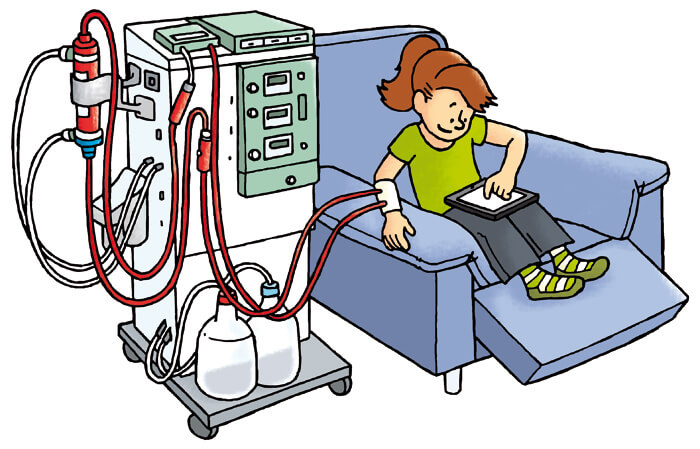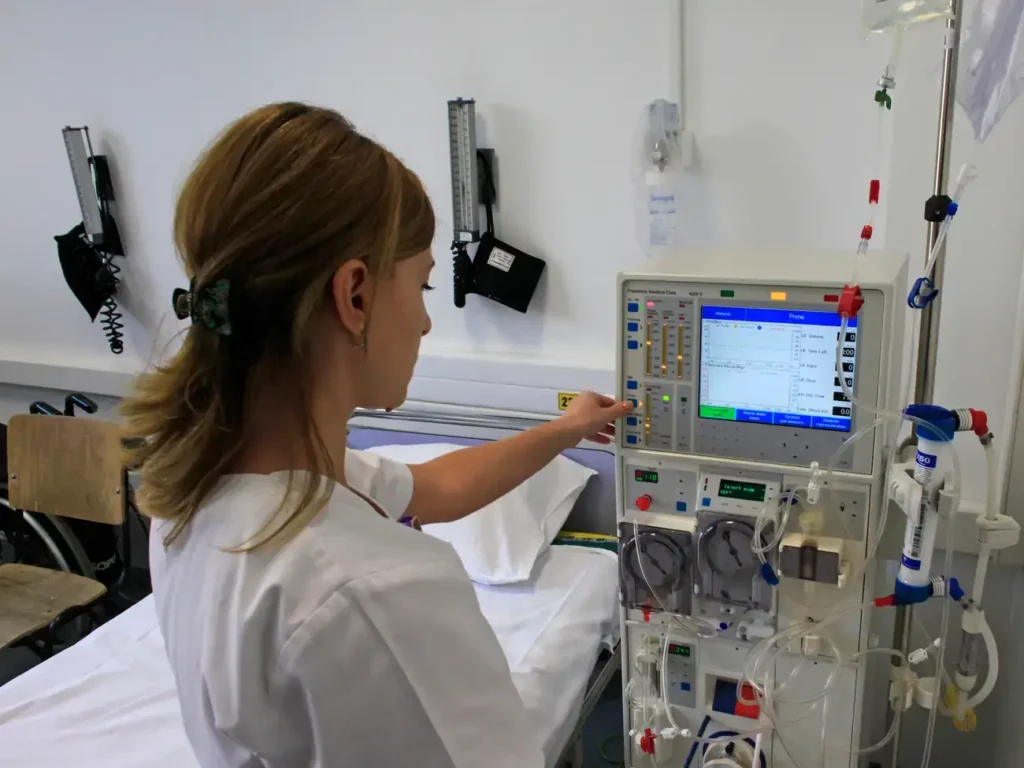What is a Dialysis Nurse?
A dialysis nurse is a Registered Nurse (RN) specialising in caring for patients with kidney diseases. They help patients suffering from acute or chronic kidney failure undergo dialysis treatment, a procedure that removes toxins from the body when the kidneys fail.
Dialysis nurses may work in various settings, although they are limited to areas where dialysis treatment is needed. These areas typically include; hospitals, dialysis clinics, and outpatient clinics.
Because of the frequent treatment patients require, these nurses may also administer dialysis to patients in their homes.
What Does a Dialysis Nurse Do?
Dialysis nurses provide direct and individualised care to patients who are in varying levels of treatment for kidney problems. These treatments may include hemodialysis and peritoneal dialysis.
Hemodialysis is a procedure where a dialysis machine and an external artificial kidney called a dialyzer are used to purify the blood.
Dialysis nurses employ hemodialysis when treating acute and chronic kidney conditions. Acute dialysis requires immediate hemodialysis treatment, while chronic dialysis involves 2-3x hemodialysis every week.
During hemodialysis, dialysis nurses check and record patients’ vitals, set up dialysis machines correctly, and teach patients how to operate when dealing with home dialysis machines.
Peritoneal dialysis completely differs from hemodialysis. It involves a soft plastic tube (catheter) surgically placed inside the body, and a cleansing fluid passed through the catheter into the belly. After the filtering process, the fluid leaves the body through the catheter.
The dialysis nurse sets up the machine by afternoon or evening and removes it the next morning. After each completed procedure, the dialysis nurse manually empties the bags used during peritoneal dialysis into the toilet.

Duties and Responsibilities of a Dialysis Nurse
Other duties and responsibilities of a dialysis nurse during hemodialysis or peritoneal dialysis include:
- Assessing patients’ needs and creating a customised treatment plan.
- Educating patients, patient’s families, and caregivers on how to manage their illness, treatment options, kidney disease management, and suitable nutrition and exercise regimens.
- Teaching patients, their family members, and caregivers how to operate and manage home dialysis machines should they decide on home dialysis therapy.
- Preparing dialysis machines and medications.
- Assessing patients before, during, and after dialysis treatment.
- Recording patient’s medical information and vital signs
- Cleaning and dressing permanent and temporary catheters for peritoneal dialysis
- Providing pre-and post-procedure care to patients
- Maintaining medical inventory
- Notifying other medical staff about any changes to the patient’s conditions
- Collecting bloodwork and other lab tests
- Scheduling treatment
- Administering medication when needed.

How to Become a Dialysis Nurse
The steps to becoming a dialysis nurse are very similar to other nursing specialties, they are:
Step 1: Attend Nursing School
The first big step to becoming a dialysis nurse is to become an RN.
You need to earn either an Associate’s Degree in Nursing (ADN) or Bachelor of Science in Nursing (BSN). This can take anywhere between 2-4 years.
Step 2: Obtain your RN licensure
After earning your ADN or BSN, you will be eligible to take the National Council Licensure Examination for RNs (NCLEX-RN) to become a licensed registered nurse.
Step 3: Gain Clinic Experience
Before becoming a dialysis nurse, you’ll need adequate bedside experience — at least 2,000 hours over the last two years — in nephrology or dialysis nursing.
It is advisable to gain experience in nephrology nursing as fresh graduates rarely get direct dialysis nursing roles.
Step 4: Earn Nephrology/Dialysis Certification
The Nephrology Nursing Certification Commission (NNCC) offers certificate examinations for nurses specialising in Dialysis/Nephrology. After meeting all the requirements, you can take the NNCC exam to become a Certified Dialysis Nurse (CDN).
Step 5: Get a Job
After earning your nephrology/dialysis certification, the last step to becoming a dialysis nurse is to get a job as one.
Luckily, getting a job as a dialysis nurse is not as hard as it used to be, with free platforms like Velju dedicating resources to help old and fresh dermatology nurses get hired by employers without even having to apply for jobs.

FAQ
Is it hard being a dialysis nurse?
Although being a dialysis nurse is rewarding, it could get challenging, just like every other profession. You may find yourself working 10-hours or 12-hours shifts, standing and walking around, lifting to 20-50 pounds weight, every typical workday. Even if you don’t have a family at home, leaving early for work and getting home extremely tired later in the evening could cause major burnouts.
How much does a Dialysis Nurse make in the EU?
Dialysis nurse salaries vary, depending on location, experience, and degree level. According to PayScale data, the average wage paid to dialysis registered nurses (RNs) in the UK stands at about £15.12 every hour, which calculates to £28,895 every year.
Here’s a breakdown of the average salary dialysis nurses make in other European countries:
Germany: According to PayScale, dialysis RNs earn an average base salary of €26,943 annually.
Italy: According to Salary Expert, dialysis nurses working in Rome earn an average base salary of €39 556.
Ireland: Dialysis nurses in Ireland earn an average salary of €18.81 every hour or €36,000 annually.
France: The average nurse dialysis salary in Paris, France, is €46 376 every year or an equivalent hourly rate of €22.
Netherlands: Data from the Economic Research Institute shows that dialysis nurses in the Netherlands make an average base salary of €32/hr or €65,535 annually.




